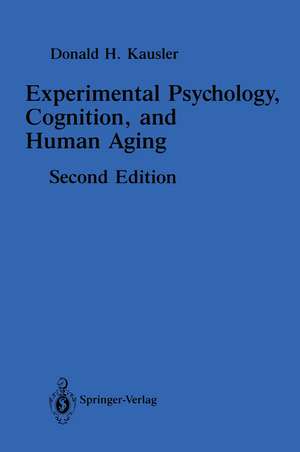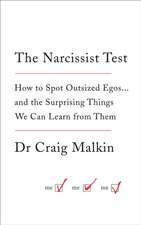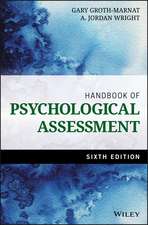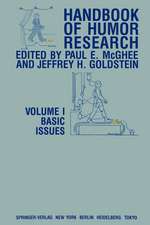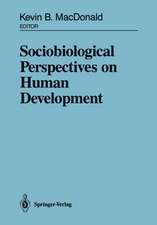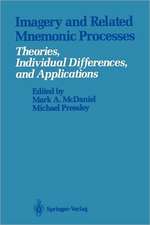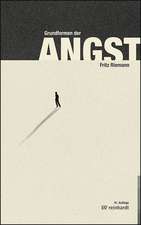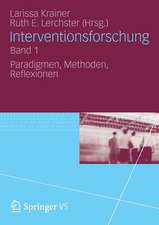Experimental Psychology, Cognition, and Human Aging
Autor Donald H. Kausleren Limba Engleză Paperback – 9 feb 2012
Preț: 421.23 lei
Nou
Puncte Express: 632
Preț estimativ în valută:
80.63€ • 87.61$ • 67.77£
80.63€ • 87.61$ • 67.77£
Carte tipărită la comandă
Livrare economică 21 aprilie-05 mai
Preluare comenzi: 021 569.72.76
Specificații
ISBN-13: 9781461396970
ISBN-10: 1461396972
Pagini: 872
Ilustrații: IX, 856 p.
Dimensiuni: 155 x 235 x 46 mm
Greutate: 1.2 kg
Ediția:2nd ed. 1991. Softcover reprint of the original 2nd ed. 1991
Editura: Springer
Colecția Springer
Locul publicării:New York, NY, United States
ISBN-10: 1461396972
Pagini: 872
Ilustrații: IX, 856 p.
Dimensiuni: 155 x 235 x 46 mm
Greutate: 1.2 kg
Ediția:2nd ed. 1991. Softcover reprint of the original 2nd ed. 1991
Editura: Springer
Colecția Springer
Locul publicării:New York, NY, United States
Public țintă
ResearchCuprins
1 Methodological Issues, Explanation, and Theory in Experimental Aging Research.- Methodological Issues with Developmental-Research Designs: The Cross-Sectional Design.- Methodological Issues with Developmental-Research Designs: The Longitudinal Design.- Methodological Issues with Developmental-Research Designs: Sequential Designs.- Other Methodological Issues.- Identifying Age-Sensitive and Age-Insensitive Processes.- Alternatives to Traditional Interaction Research.- Theory and Its Interface with Experimental Aging Research.- Summary.- 2 Sensory Psychology and Perception.- Sensory Sensitivity and Psychophysical Research.- Sensitivity Versus Decision-Making Processes.- Adult Age Differences in Other Sensory Phenomena.- Adult Age Differences in Basic Perceptual Phenomena.- Adult Age Differences in Perception Attributable to Changes in Stimulus Persistence.- Adult Age Differences in Pattern Recognition.- Methodological Comment.- Summary.- 3 Attention.- Vigilance.- Selective Attention.- Divided Attention.- Summary.- 4 Learning: Conditioning, Instrumental, Motor Skill, Procedural.- Learning or Memory?.- Adult Age Differences in Conditioning.- Adult Age Differences in Instrumental Learning.- Adult Age Differences in Motor Skill Learning.- Adult Age Differences in Procedural Learning.- Abnormal Aging and Learning.- Summary.- 5 Learning: Verbal Learning, Mnemonics, Transfer.- Adult Age Differences in Verbal Learning: Paired-Associate Learning.- Analysis of Age-Sensitive Processes.- Adult Age Differences in Verbal Learning: Serial Learning.- Abnormal Aging and Verbal Learning.- Mnemonics.- Adult Age Differences in Transfer.- Comments.- Summary.- 6 Memory: Models of Episodic Memory and Related Research Issues.- Overview of the Human Memory System.- Adult Age Differences in Sensory Memory.- Adult Age Differences in Episodic Memory: Dual-Store Model.- Adult Age Differences in Episodic Memory: Levels-of-Processing Model.- Adult Age Differences in Episodic Memory: Resource Models.- Summary.- 7 Episodic Memory: Effortful Phenomena.- Adult Age Differences in Organizational Processes.- Adult Age Differences in the Generation Effect.- Adult Age Differences in Effortful Episodic Memory: Encoding Variability and the Lag Effect.- Adult Age Differences in Recognition Memory.- Adult Age Differences in Picture/Face Memory.- Adult Age Differences in Retrieval.- Adult Age Differences in Prospective Memory.- Adult Age Differences in Memory for Discourse.- Abnormal Aging and Effortful Episodic Memory.- Summary.- 8 Rehearsal-Independent Episodic Memory: Long-Term Forgetting.- Adult Age Differences in Memory for Noncontent Attributes of Episodic Events.- Adult Age Differences in Memory for Activities and Actions.- Adult Age Differences in Other Forms of Rehearsal- Independent Memory.- Abnormal Aging and Rehearsal-Independent Memory.- Adult Age Differences in Long-Term Forgetting.- Abnormal Aging and Long-Term Forgetting.- Summary.- 9 Generic Memory: Internal Lexicon, Implicit Memory, Metamemory.- Internal Lexicon.- Adult Age Differences in the Use of Syntax.- Abnormal Aging and the Internal Lexicon.- Implicit Memory.- Abnormal Aging and Implicit Memory.- Metamemory.- Summary.- 10 Thinking: Concept Formation and Identification.- Classical-Concept Formation and Identification.- New Directions in Research on Concept Acquisition.- Summary.- 11 Thinking: Problem Solving and Reasoning.- Problem Solving.- Verbal and Numerical Reasoning.- Spatial/Imaginal Reasoning.- Stage Theory of Cognitive Development and Age Changes in Thinking.- Summary.- 12 Intelligence.- GeneralIssues in Research on Aging and Intelligence.- Psychometric Studies of Adult Age Differences in Intelligence: Global Assessments.- Psychometric Studies of Adult Age Differences in Intelligence: Special Abilities.- Relationship Between Special Abilities: The Differentiation/ De-differentiation Hypothesis.- Crystallized and Fluid Intelligence.- Abnormal Aging and Intelligence.- Terminal-Drop Phenomenon.- The Performance/Competence Issue.- Plasticity, Activity, and Intervention.- Intelligence in the Laboratory: Relationships Between Information Processing and Intelligence.- Summary.- References.- Author Index.
